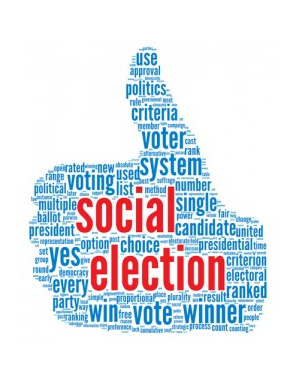Our World is Shaping Politics

You are typing on your phone. There was another debate tonight, and the topic is currently trending. You are asking questions that you hope will be answered. The news channel may just pick your question! You have information at your fingertips, and you want to get your voice out there.
How can this happen? Well, nowadays information is easily accessed through social media, and opinions are expressed just as easily, especially in politics. Take the current presidential race. News channels such as CNN take questions from social media, such as YouTube, Facebook, Twitter, and other sites. People can just submit questions with the tap of a few keys. Just as easily, the candidates can open social media accounts and post their opinions and connect to society more than they could in the past. For example, Democratic candidate Bernie Sanders has followers on Twitter that are starting viral movements. They created the hashtag #FeelTheBern,which has been used a little less than Hillary Clinton’s hashtag #Hillary2016. This popularity difference is also reflected in the candidates’ poll numbers, which are also very close. Some candidates also use social media as a form of advancing their campaigns. For example, Republican Donald Trump attacked Jeb Bush’s slogan “Jeb can fix it!” on Twitter when Jeb was still a part of the race. This extra platform for the candidates to express their views helps voters get more of a sense of who they’re really electing, and whether that person is just saying a prepared speech for television or whether they truly have good ideas or not.
If a candidate is trending on Twitter, for example, then they appeal more to the masses. This can be more accurate than taking a poll of only a few people to artificially show that a candidate is popular. Before, candidates used their money and power popular to make themselves appear popular on television, and that is all the public saw of them, but now there is another dimension. Social studies teacher Mr. Ellis said of social media and politics, “Politicians are quite crafty at not showing their true personality and tactics. The brevity of social media has made this even easier for politicians, considering that follow up questions on some of the types of social media really do not create the format for that sort of thing. Nor does it force the candidates to elaborate on their positions.” For example, John Kennedy was the first successful candidate on television. Later, Ronald Reagan and Bill Clinton perfected the form. They were good actors who could project a casual demeanor while making themselves appear larger than life. Now, politicians can use social media to act further or even talk honestly, but they do this very rarely.Even for high school students, politics is relevant because they can educate themselves for the future through a medium that they use everyday. Although candidates have to do more than Tweet to get elected, social media can help ensure that the right people get elected and that all voices get heard.

